Key takeaways
Legal AI tools are software programs that leverage artificial intelligenc to enhance and streamline law firm processes.
AI legal tools use algorithms and machine learning to automate tasks that are typically repetitive and time-consuming.
Traditional AI systems follow predefined algorithms and rules to accomplish specific tasks.
Legal generative AI, on the other hand, is trained on a large amount of data and is not limited to specific tasks. Understanding the differences between AI and generative AI can help you evaluate platforms and choose the right tools for your firm.
AI is rapidly transforming the way law firms operate. Legal AI tools are making it easier for lawyers and legal professionals to streamline processes, automate tasks, and increase efficiency and productivity.
The 2025 Legal Industry Report shows that 31% of lawyers already use legal generative AI tools at work, and 45% engage with them every day. Their top tasks for delegation are drafting correspondence (54%), brainstorming strategy (47%), and general research (46%).
Picking the right tools can be confusing. This 2025 legal AI software comparison guide spotlights 13 best-in-class tools from leading legal AI companies.
For more insights across everything from AI ethics to legal research to firm productivity, explore our AI for Law Firms Resource Center for the full library of expert articles.
1. MyCase IQ
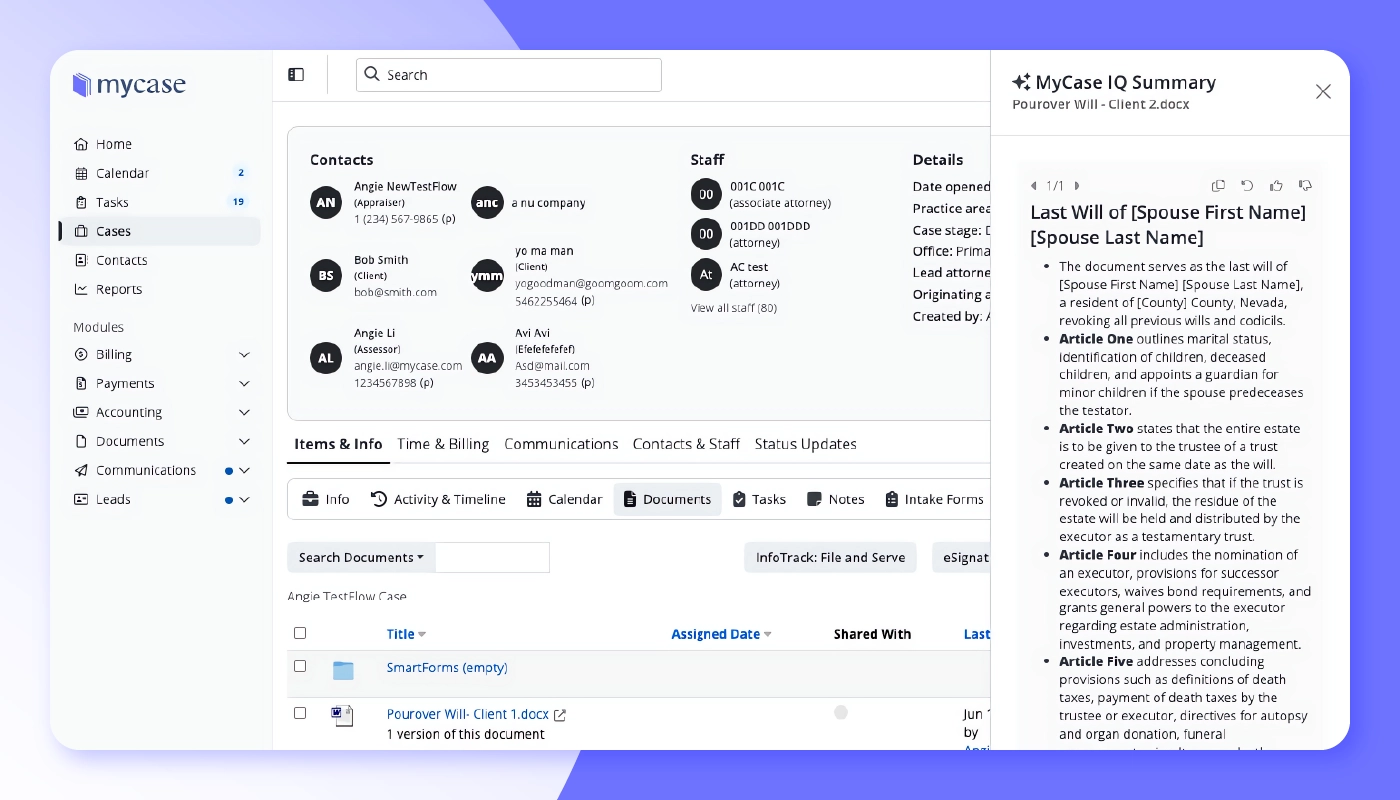
Category: Legal Writing and Document AI
MyCase IQ is the integrated AI engine within MyCase’s practice management platform, purpose-built for law firms that want legal generative AI tools without cobbling together consumer apps. Because it operates within your existing workflows, you can draft, revise, and summarize case materials in the same place you manage matters, billing, and client communication.
Beyond faster writing and language translations, this legal AI software will be able to surface deadlines, analytics, and matter history on demand, turning static records into real-time insights. The roadmap also includes natural language search across all firm data, so attorneys can ask questions and get answers directly from their secure files.
Capabilities:
Document summarization that distills lengthy documents into key takeaways in seconds.
AI-powered text editing to adjust tone, length, or clarity before you hit send.
Automated language translations within the platform to communicate with clients in their native language.
2. Lex Machina
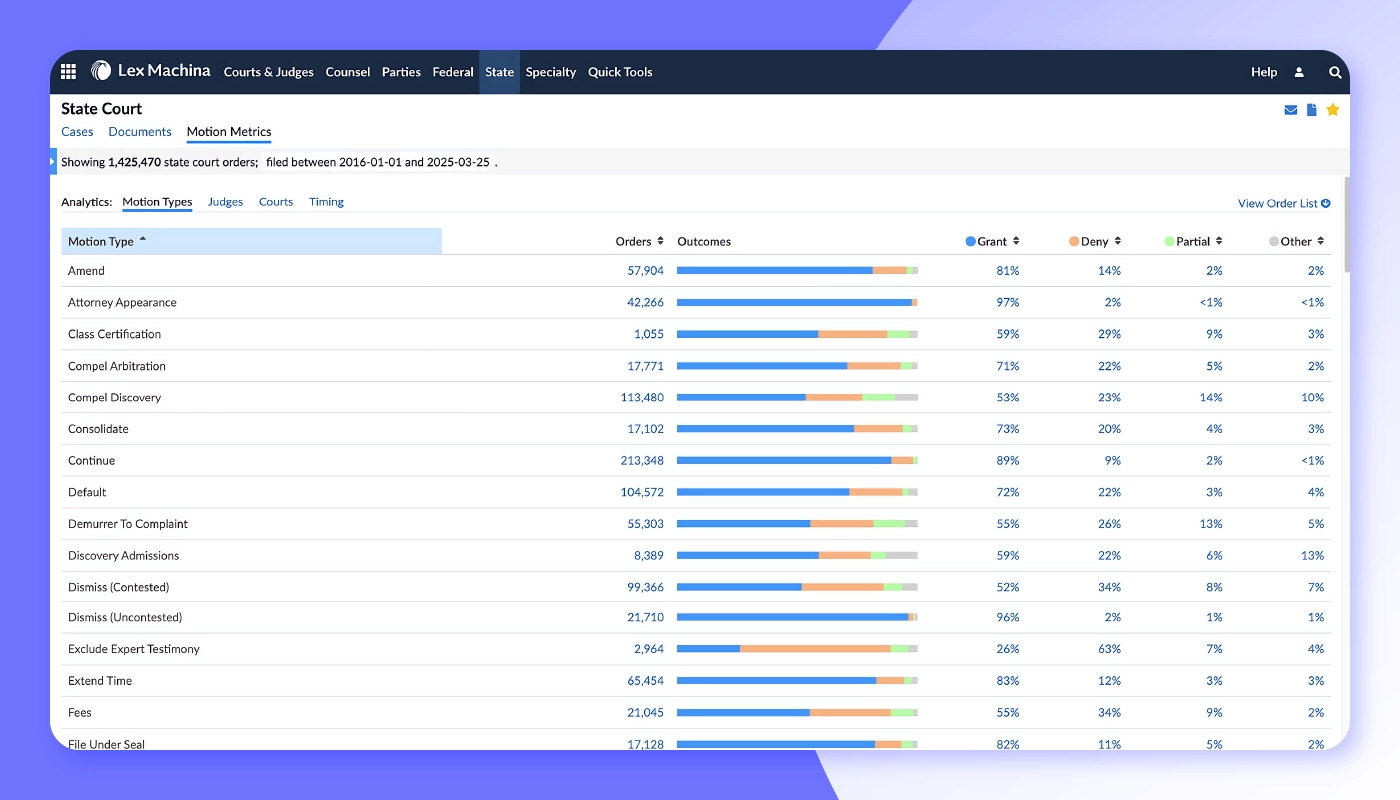
Category: AI Legal Analytics
Lex Machina, a LexisNexis company, turns raw docket data into strategic intelligence. Its Legal Analytics platform parses millions of federal and state court filings, then maps outcomes, damages, and motion histories to every judge, party, and opposing counsel.
The newest upgrade, Protégé, layers generative AI on top of that data, allowing lawyers to type a plain-language prompt and receive an instant, citation-ready answer.
Without losing valuable time to manual research, you can walk into court knowing how often your adversary settles, which arguments tend to sway a judge, and what damages similar plaintiffs have secured. The result is sharper risk assessment, more persuasive pitches, and smarter resource allocation.
Capabilities:
Protégé generative analytics, natural-language queries that surface targeted litigation data on demand.
Judge and court dashboards that reveal ruling tendencies, time-to-trial averages, and motion success rates.
Counsel and party comparisons to gauge an opponent’s track record and settlement behavior across jurisdictions.
Outcome and damages models that predict likely case trajectories and financial exposure using historical analytics.
3. Briefpoint
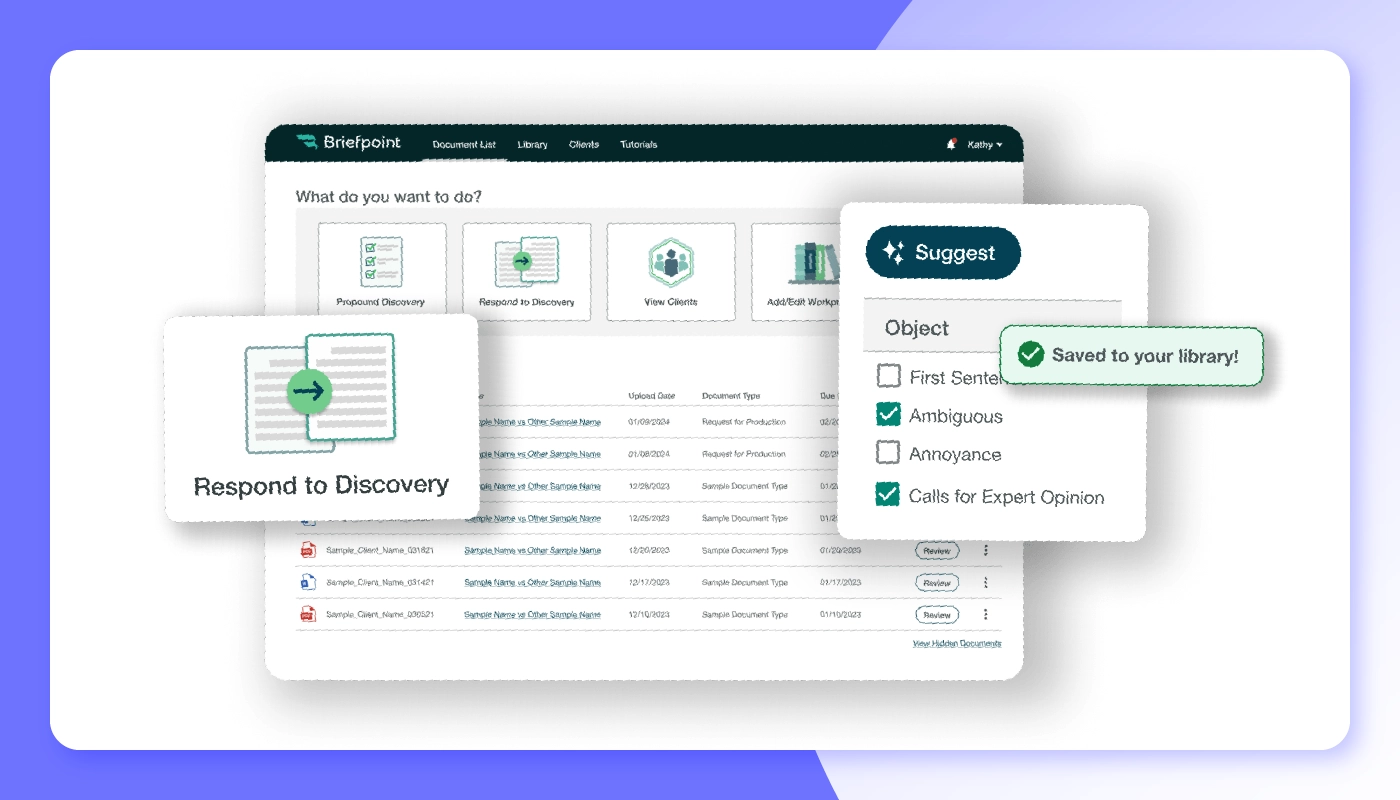
Category: AI Document Drafting
Briefpoint is an AI tool for legal drafting and responding to discovery. Instead of retyping boilerplate objections and formatting everything by hand, attorneys simply upload the opposing party’s requests. Briefpoint’s machine learning engine then creates a first draft, complete with jurisdiction-specific formatting and commonly used objections.
Recent releases have added automatic extraction of court details, smarter objection suggestions, and optional routing to paralegals for review before attorney sign-off. That workflow enables same-day turnarounds—replacing late nights and weekends—for firms buried under interrogatories, requests for admission, or RFAs.
Capabilities:
Upload any discovery request and receive a fully drafted response, objections included, in minutes.
Auto-extracts court names, case numbers, and request types to reduce manual data entry.
Applies local court formatting rules and numbering so documents are filing-ready out of the box.
Exports to Microsoft Word for final edits, redlines, or e-signature workflows without breaking formatting.
4. Legalyze.ai
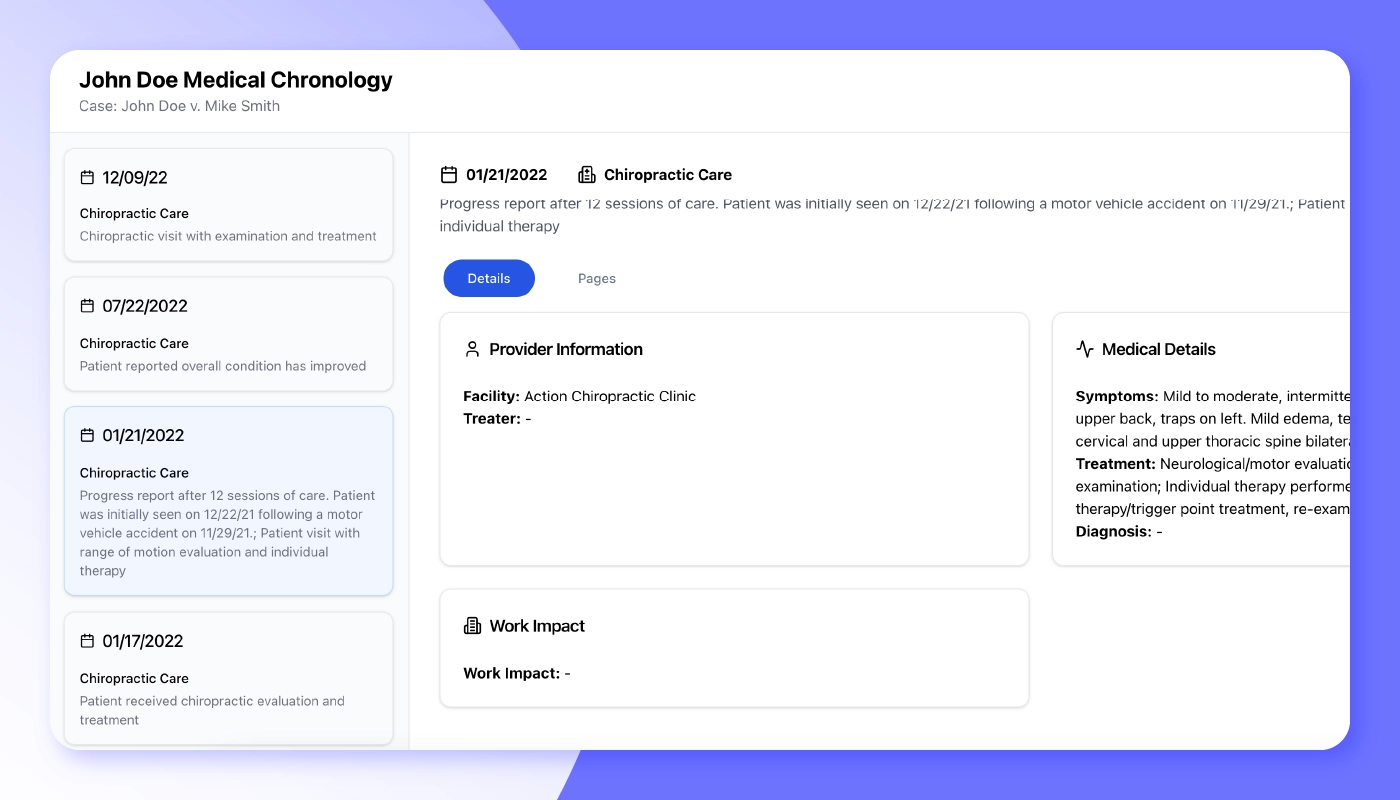
Category: AI Medical Document Review
Legalyze.ai combs through thousands of pages of medical records in personal injury and med-mal cases. Its cloud platform builds an AI-generated medical chronology, and since each event links back to the exact page in the source PDF, attorneys can trace injuries, treatments, and gaps in care without hours of manual cross-referencing.
Beyond speed, Legalyze.ai acts like a bespoke legal AI chatbot for your case files. Users can ask plain-English questions and receive answers with pinned citations. Tight integrations with leading case-management systems, including MyCase, CASEpeer, and Smokeball, keep records and chronologies synced so firms don’t waste time shuffling exports.
Capabilities:
AI medical chronologies that map every treatment event to the precise source page for instant verification.
Ask questions about your records in natural language and get citation-backed answers in seconds.
Handwriting recognition that deciphers scanned physician notes and handwritten charts as accurately as typed text.
One-click CMS integrations with MyCase, CASEpeer, Smokeball, and more, keeping records, summaries, and chronologies in sync.
5. Luminance
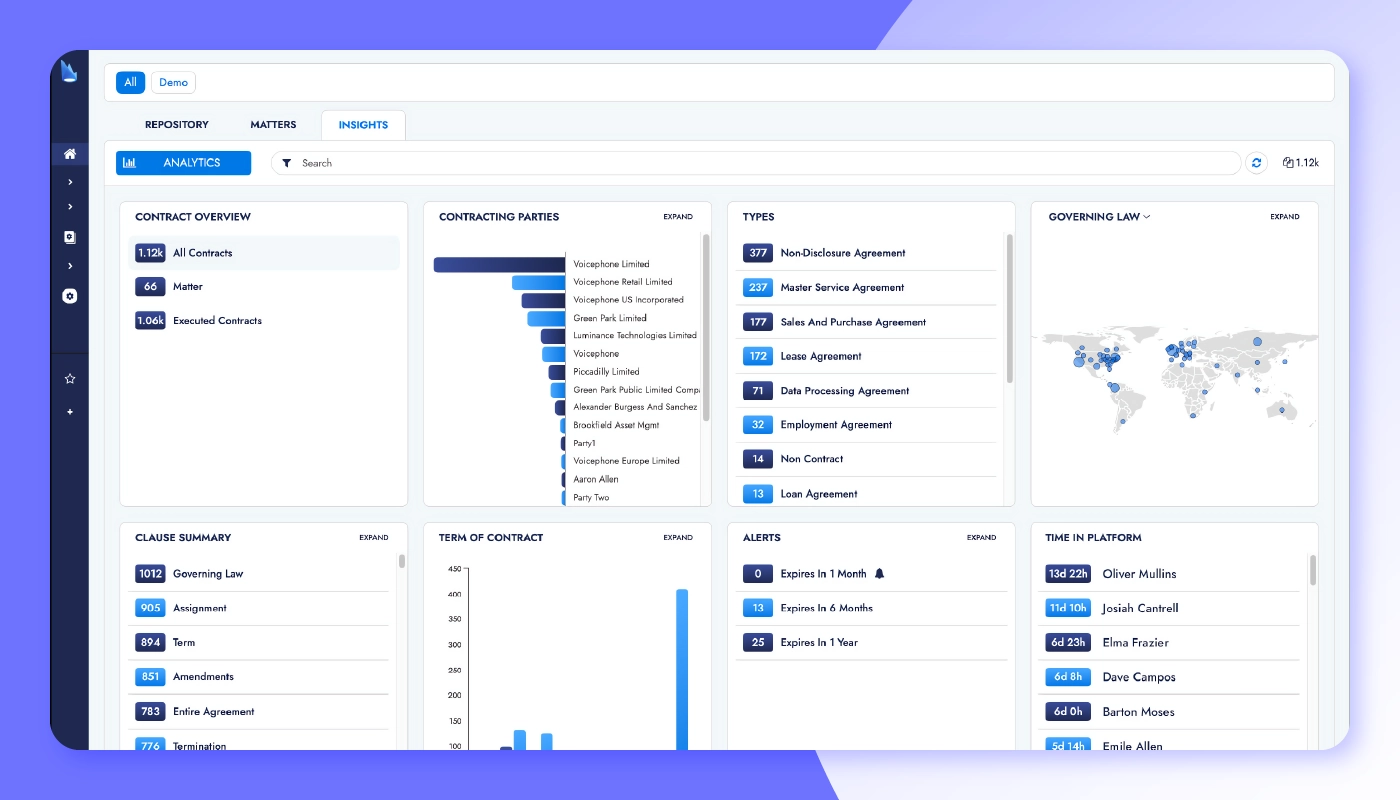
Category: AI Contract Lifecycle Management
Luminance is a UK-based pioneer in legal contract AI tools, trusted by more than 700 organizations to automate every touchpoint a business has with its contracts. Its proprietary Legal-Grade AI uses a “mixture-of-experts” model to understand language, identify risk, and keep deals moving.
The platform includes three modules:
Corporate brings first-pass review and automatic markup into Microsoft Word.
Diligence detects anomalies across 1,000+ clause concepts for quick rep-and-warranty checks.
Discovery layers AI-powered search, technology-assisted review, and automatic PII redaction onto large data sets.
Capabilities:
First-pass contract analysis and auto-markup inside Microsoft Word, with suggested edits and issues.
AI chatbot for Q&A and automated redrafting, turning plain-language prompts into compliant clauses.
Anomaly detection across 1,000+ pre-built clause concepts to surface hidden risks in seconds.
Automatic clause compliance, PII detection, and redaction, plus visual dashboards to track review progress.
6. Relativity aiR
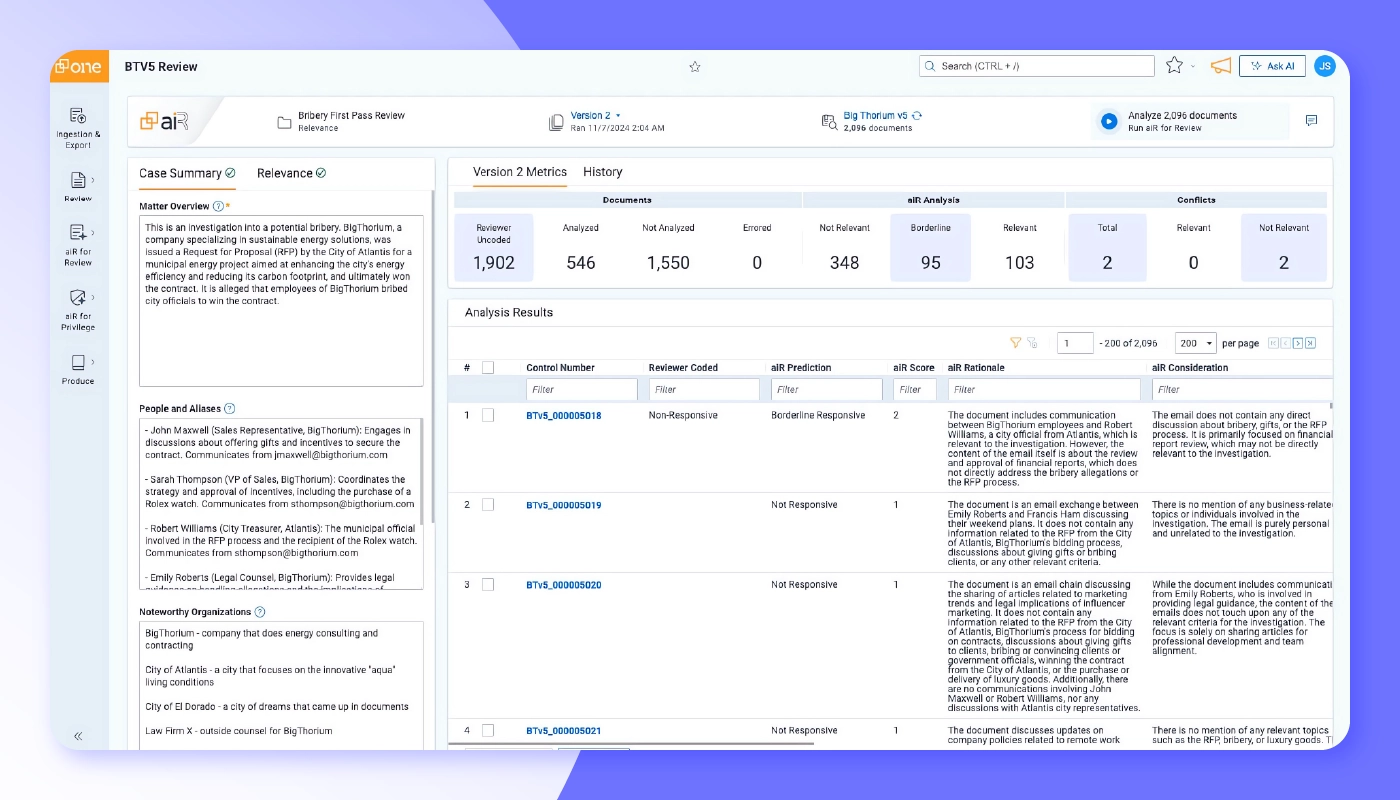
Category: AI eDiscovery
Relativity aiR is the generative AI layer inside RelativityOne, designed to push eDiscovery review, privilege calls, and production prep from days to hours. By pairing large language model insight with Relativity’s existing analytics, aiR can classify millions of documents, explain its reasoning, and surface the few that truly matter.
Relativity has begun rolling out purpose-built aiR modules, including aiR for Review, aiR for Privilege, and aiR for Translation—each tuned to a specific discovery pain point. Users can ask natural-language questions and receive answers with highlighted passages and transparency into why the model chose them.
Capabilities:
Generative review accelerator that groups, ranks, and summarizes responsive documents so attorneys see what matters first.
Privilege prediction and log drafting via aiR for Privilege, cutting hours from privilege review and log creation.
Continuous active learning to refine relevance predictions in real time as reviewers make coding decisions.
Built-in multilingual translation and sentiment analysis, eliminating the need for separate translation vendors or plug-ins.
7. Clearbrief
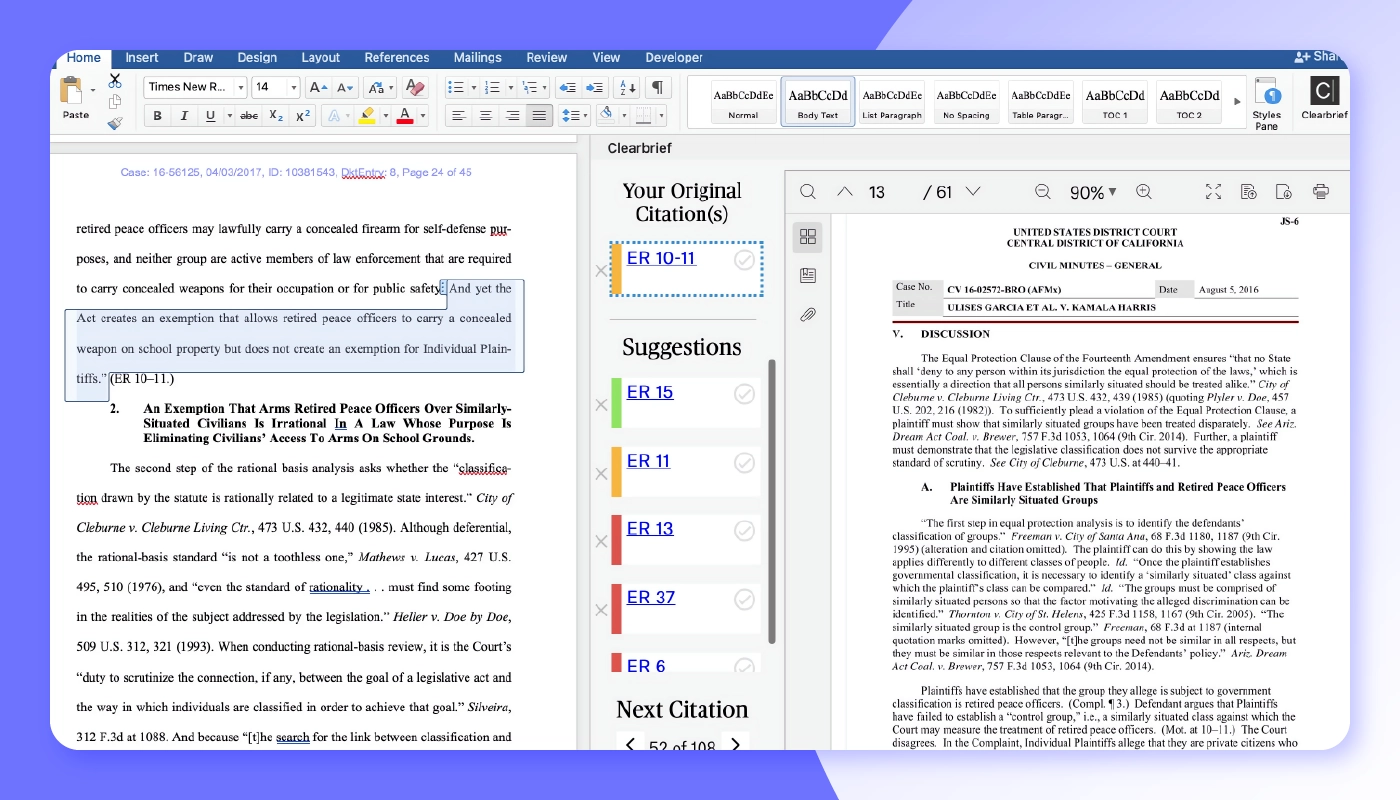
Category: AI Legal Analytics
Clearbrief uses AI to match every assertion in a brief or motion with the exact page of supporting evidence.
Litigators can highlight a sentence within Microsoft Word, and Clearbrief instantly pulls the best proof, such as depositions, medical records, and emails, and inserts a hyperlink.
Because Clearbrief plugs into repositories like Relativity, iManage, and NetDocuments, firms can drag-and-drop discovery, verify citations, and generate a filing-ready PDF (with exhibits and a Table of Authorities) in a single workflow. The result is persuasive, evidence-rich filings without the late-night cite checks.
Capabilities:
Highlight any sentence and surface the strongest supporting document, with live hyperlinks back to the source.
Flags uncited or weakly supported statements and suggests stronger evidence or case law.
Generates fact chronologies, hyperlinked PDFs, and ready-to-file Tables of Authorities in minutes.
Syncs with Relativity, iManage, NetDocuments, and select practice-management tools to keep discovery and drafts in step.
Integrates with MyCase to automate legal brief writing and discovery analysis.
8. CoCounsel
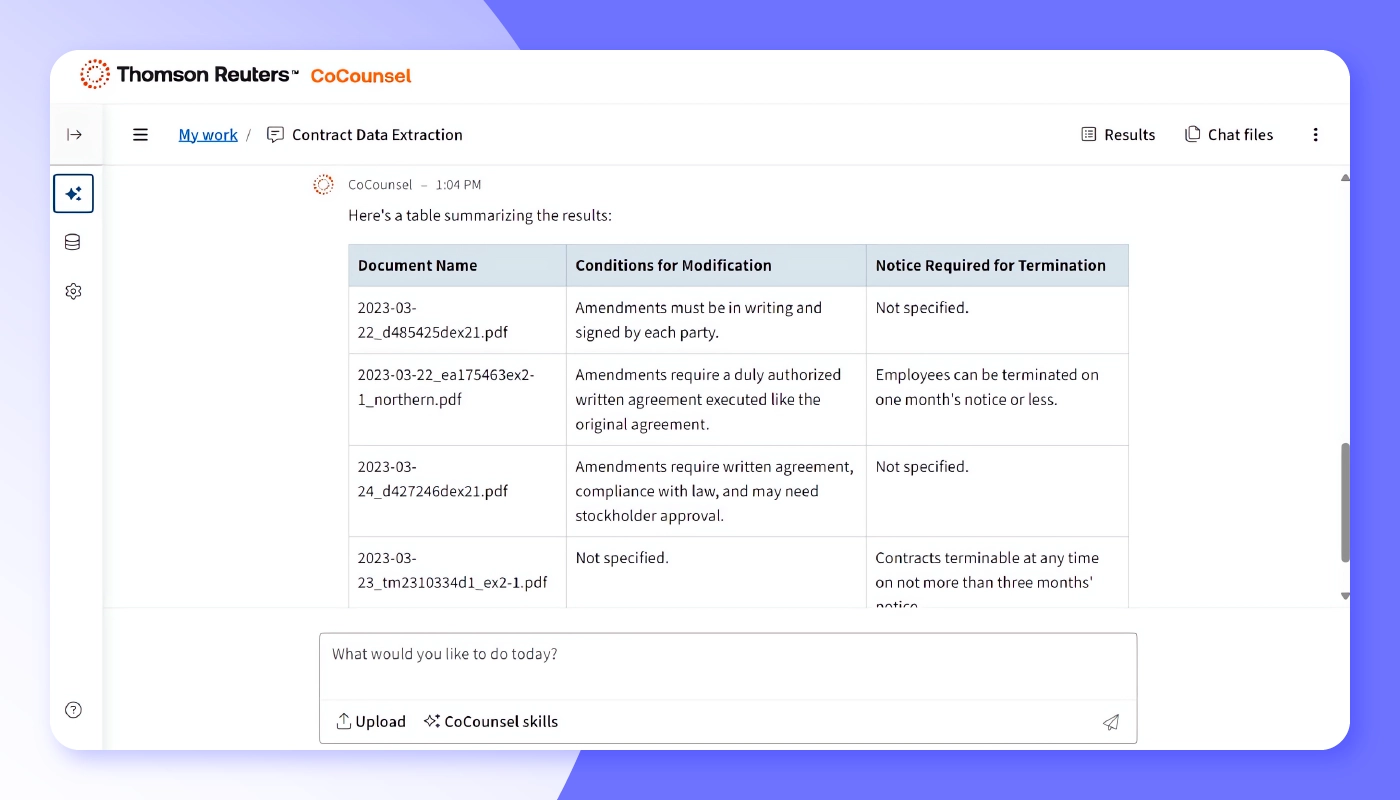
Category: AI Legal Assistant
CoCounsel is Thomson Reuters’ professional-grade AI assistant, built on the deep content libraries of Westlaw and Practical Law. Lawyers can delegate complex research, drafting, and comparison tasks to the assistant and receive citation-backed results that trace every conclusion to primary sources.
The latest release adds agentic capabilities, such as multistep workflows that move from goal to finished work product with human oversight. It mirrors the broader rise of the chatbot trend in law firms.
CoCounsel’s new modules handle everything from deposition analysis to policy generation, giving firms big law-level bandwidth without ballooning headcount.
Capabilities:
Natural-language research across Westlaw, Practical Law, and firm documents returned with pinpoint citations.
Drafting and contract-analysis skills that convert prompts into polished memos, policies, or redlined agreements.
Agentic workflows that string together multiple tasks, like reviewing documents, extracting issues, and drafting a summary, under one command.
Secure Microsoft 365 integration so attorneys can invoke CoCounsel inside Word, Outlook, and Teams without leaving their workspace.
9. Darrow
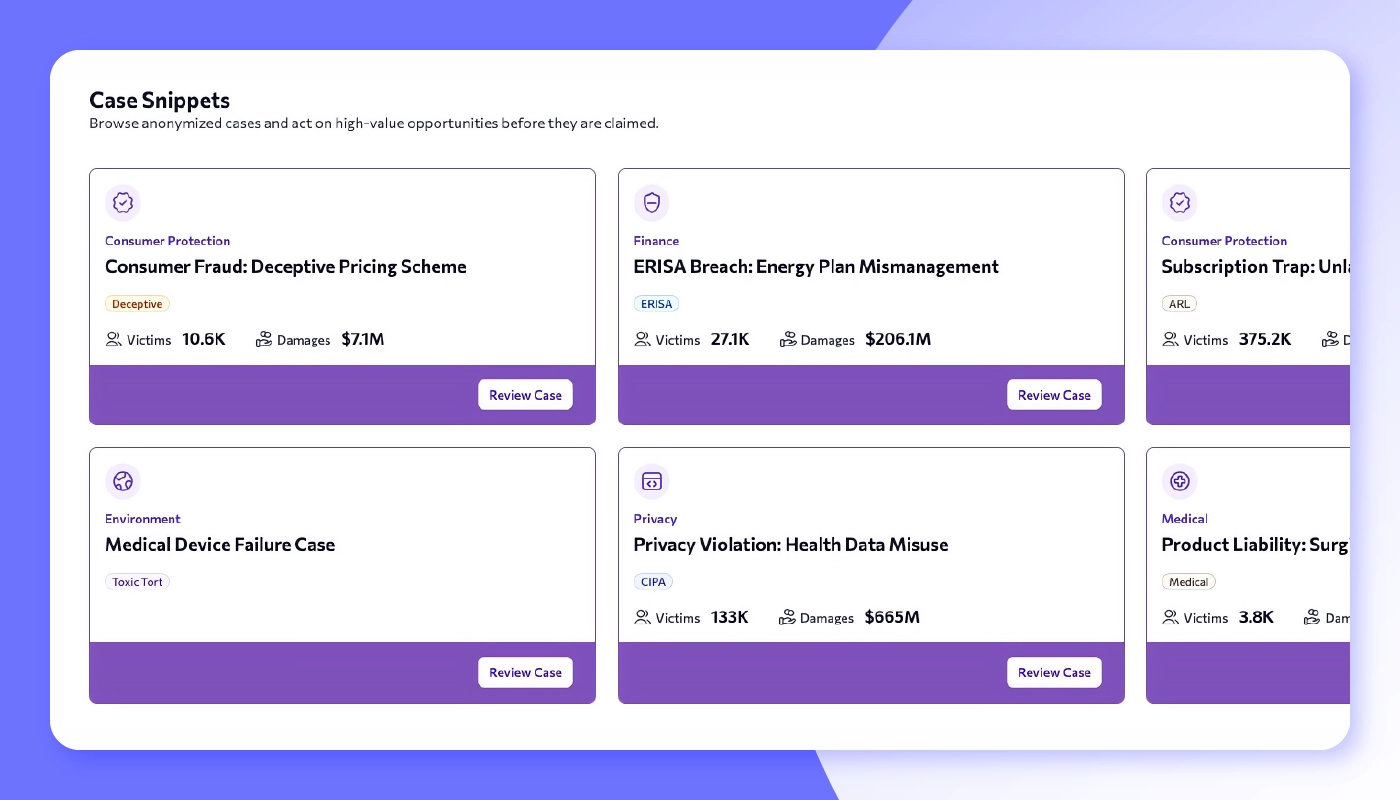
Category: AI Legal Risk Intelligence
Darrow’s Legal Intelligence Platform scans news, regulatory filings, consumer complaints, and financial data to surface patterns of harm.
The platform is organized into three modules:
Insight monitors public data to flag emerging legal risks.
PlaintiffLink matches qualified claimants to your firm in days (not months).
Enterprise delivers proactive compliance intelligence for in-house legal teams.
Together, these tools shorten the business-development cycle and replace guesswork with data-backed case selection.
Capabilities:
Real-time violation detection across news, regulatory dockets, and consumer-complaint databases, pinned to specific statutes and jurisdictions.
Automated damages and class-size estimates that help firms gauge potential recovery before investing resources.
PlaintiffLink campaigns that source, qualify, and onboard claimants via targeted digital outreach, then feed them straight into your intake workflow.
Practice-area dashboards with precedent analytics and risk scoring to prioritize the most winnable, highest-impact cases first.
10. Billables AI
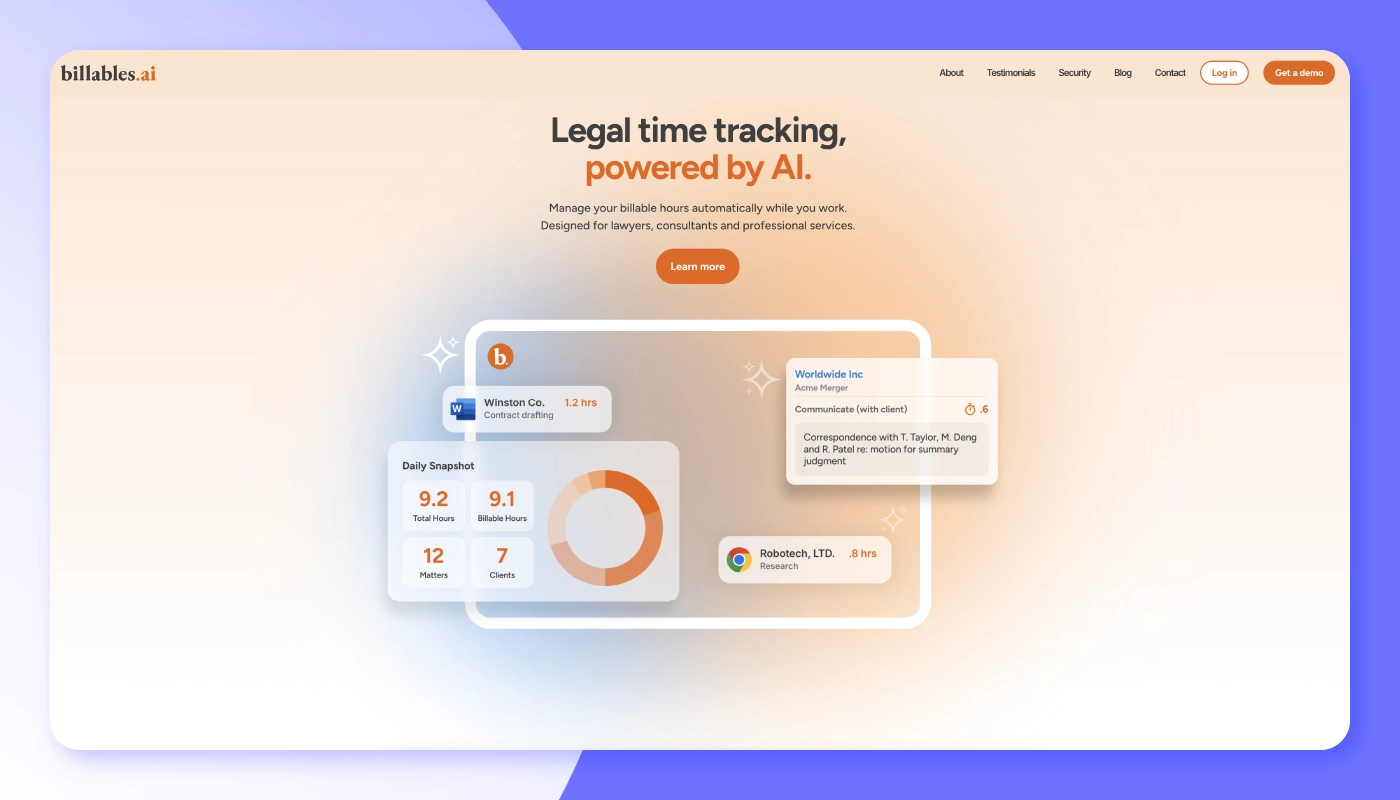
Category: AI Time Tracking
Billables AI runs in the background and captures every call, email, and document edit as it happens. The platform uses machine learning to automatically draft time narrative descriptions, then syncs those entries directly into your practice management or billing system.
Tight integrations reinforce that promise: A dedicated Billables AI + MyCase workflow auto-tags captured activity to the correct matter and client, while plug-ins for Clio, Office 365, and Google Workspace make it equally useful for firms on other stacks. The result is less end-of-month scrambling, cleaner invoices, and more revenue without raising rates.
Capabilities:
Automatic time capture that records emails, meetings, document work, and calls in real time.
AI-generated narratives that turn raw activity into polished billing descriptions, cutting narrative-writing time by up to 90%.
Matter-aware syncing with MyCase, Clio, and other systems, ensuring every entry lands on the right client bill without manual matching.
Revenue dashboards and missed-time alerts that surface unbilled work and show how many hours each lawyer recaptures week over week.
11. Smith.ai
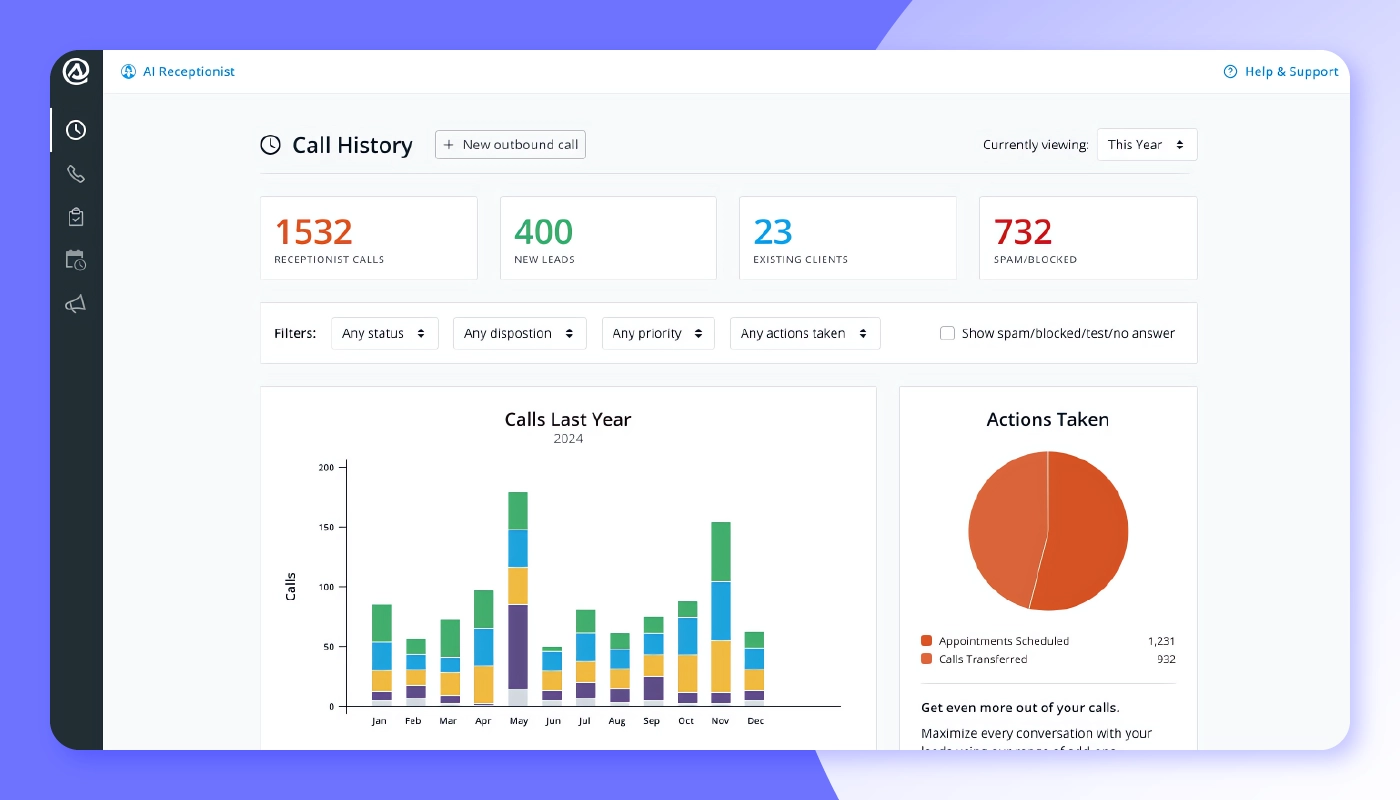
Category: AI Receptionists and Intake
Smith.ai pairs automation and live assistance to make sure potential clients never reach voicemail. The AI Receptionist answers calls around the clock, screens leads, books consultations, and even collects payments. Meanwhile, the AI-powered chat widget engages website visitors in real time and routes qualified prospects straight into your intake flow.
Because both products sync with leading CRMs and practice management platforms, every transcript, appointment, and payment automatically lands in the right place.
Add bilingual agents, outbound callback campaigns, and detailed analytics, and Smith.ai becomes a 24/7 business development engine rather than a simple answering service.
Capabilities:
24/7 AI-first call answering that screens, schedules, and accepts payments without human delay.
Live-staffed web chat that qualifies leads, answers FAQs, and transfers hot prospects to a real attorney in seconds.
Native integrations with MyCase, Lawmatics, Clio, and dozens of CRMs to push every interaction into your intake pipeline automatically.
Detailed analytics dashboards showing lead sources, conversion rates, and ROI on reception and chat activity.
12. EsquireTek Alpha and Omega
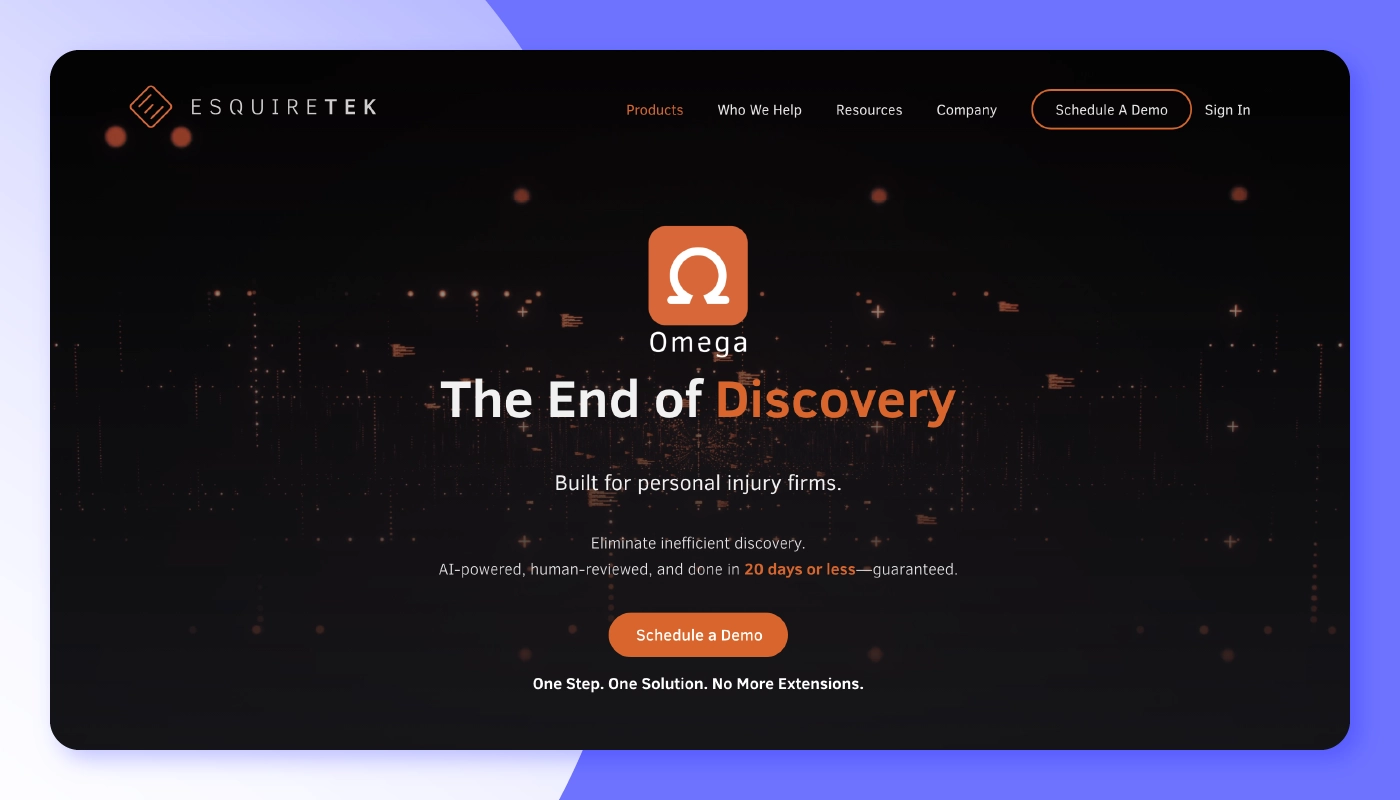
Category: AI Legal Discovery
EsquireTek offers two discovery-automation tracks: Alpha and Omega.
Alpha is a do-it-yourself platform that lets litigators upload PDF interrogatories, convert them to Word, extract questions into web forms, and draft responses with AI assistance.
Omega uses that same technology but adds a human touch. EsquireTek’s team manages client outreach, inserts objections, prepares medical chronologies and Howell charts, and delivers a signature-ready discovery packet in 20 days or less.
Capabilities:
DIY Alpha workspace that converts discovery PDFs to editable Word, auto-extracts questions, and suggests objections in one click.
Done-for-you Omega service that delivers fully reviewed responses, chronologies, and exhibits within 20 days—no setup or training required.
Web-based client questionnaires sent via text or email, with responses auto-populating final documents and privilege logs.
Seamless MyCase integration plus automated Bates stamping, Howell charts, and red-flag issue spotting for airtight, filing-ready packets.
How Can Law Firms Choose the Best Legal AI Tools?
To choose the best Legal AI tool, start by identifying your firm’s real problems. Then, pressure-test cost, credibility, and compatibility before you buy.
For example, general-purpose AI tools like ChatGPT can be helpful for simple tasks like drafting correspondence. However, many of these tools can lack citation rigor, security safeguards, or seamless integrations, which can lead to AI legal issues. To minimize risk, lawyers using ChatGPT should exercise caution and search for tested legal prompts.
The best legal AI software fills those gaps by offering authenticated sources, audit trails, and practice management plug-ins that consumer apps simply don’t offer. Firms can invest confidently by following a structured vetting process:
Vet your firm’s needs and budget: Map out repetitive pain points that law-specific AI could solve, and quantify potential time savings. Set a realistic spend ceiling, and remember that recaptured billable hours often offset subscription costs.
Solicit recommendations and read reviews: Lean on bar-association tech committees, trusted peers, and verified case studies rather than vendor hype. Look for testimonials from firms that mirror your size, practice area, and tech stack.
Review features, integrations, and security: Confirm that the legal AI technology integrates with your practice management, DMS, or billing system to avoid duplicate data entry. Prioritize SOC 2 or ISO-27001 certification, role-based permissions, and a clear policy on AI training data.
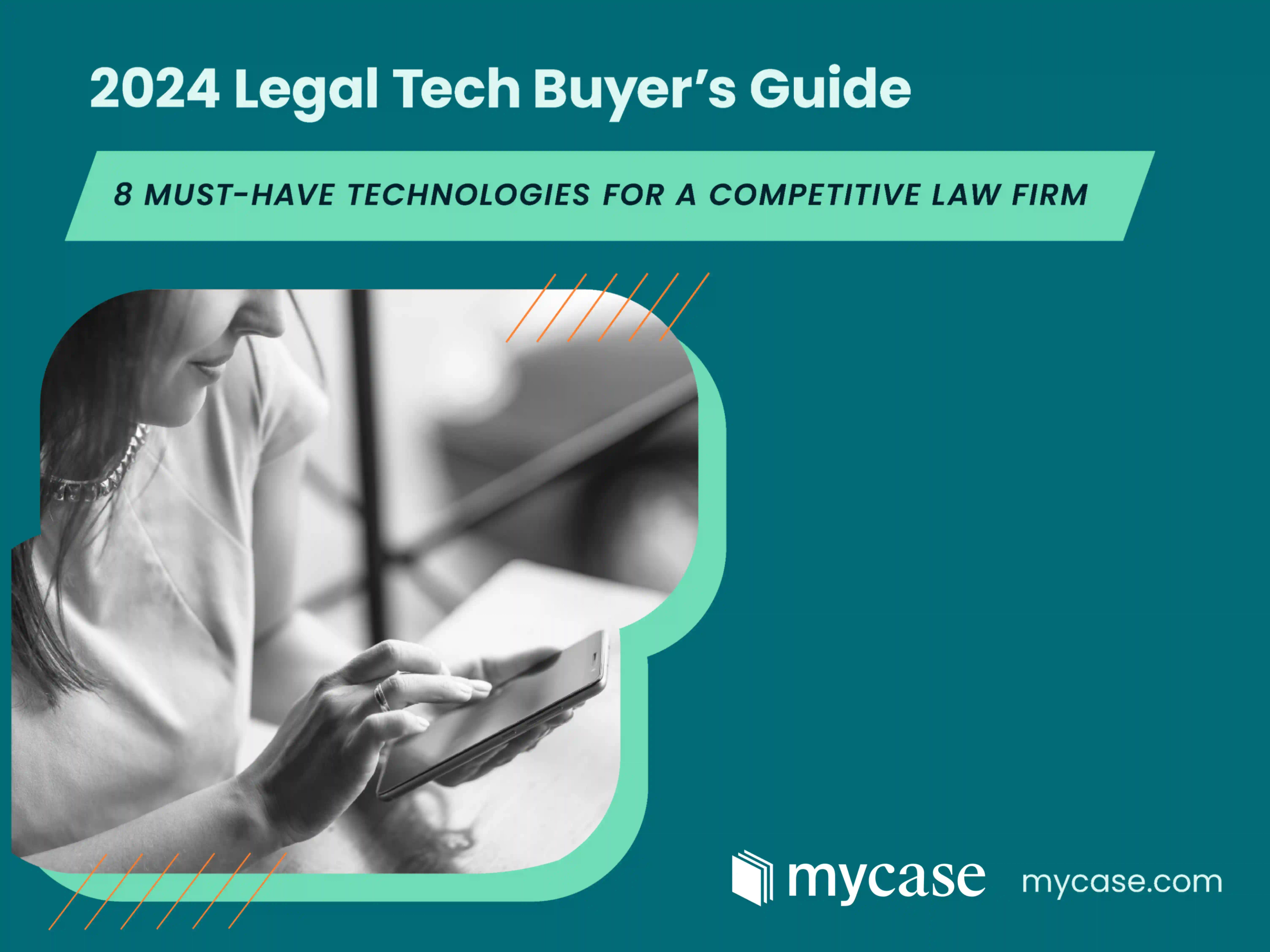
Why Should Lawyers Use Legal AI Tools?
AI tools for lawyers can turn routine work into reclaimed billable hours, sharper accuracy, and faster client service. They also improve consistency by applying specific citation rules, style guidelines, and privilege checks automatically, reducing the human slip-ups that lead to costly do-overs.
Here’s a closer look at the benefits of using great legal AI tools:
Increases productivity: 65% of lawyers who use AI report gaining up to five extra hours per week, according to the 2025 Legal Industry Report.
Boosts client satisfaction: Faster turnaround and more predictable pricing signal modern, tech-savvy service.
Levels the playing field: Smaller firms can wield analytics and drafting power that were once reserved for large corporate practices.
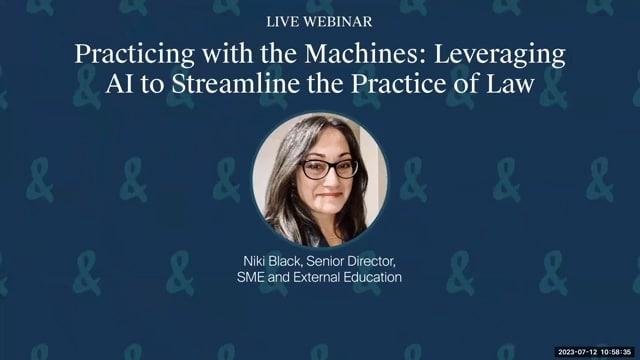
What Are the Different Types of Legal AI Tools?
There are many different types of AI tools for lawyers, and each is designed to help law firms in unique ways. Below are a few of the most common categories of legal AI software.
AI Law Practice Management (LPM) Tools
Who uses them: Solo, small, and mid-sized firms
What they do: AI-powered LPM platforms are among the top legal AI tools for attorneys since they can weave AI into everyday case work—like documents, deadlines, billing, and client communication—into a single dashboard, then layer automation on top.
These tools can draft routine correspondence, generate follow-up tasks from emails, capture billable time in the background, and surface key matter analytics without manual searches.
AI Legal Research Tools
Who uses them: Litigation associates, appellate specialists, and solo or small firms
What they do: AI-powered legal research tools combine vast primary law libraries with machine learning so attorneys can pose natural-language questions and receive pinpoint citations, summaries, and Key Number-style headnotes in seconds.
AI Legal Analytics Tools
Who uses them: Litigation attorneys (often in larger firms)
What they do: AI legal analytics tools mine millions of court filings, dockets, and rulings, transforming raw data into predictive dashboards. Attorneys can instantly see a judge’s average time-to-trial, how often certain motions succeed, an opponent’s settlement history, and damage ranges for comparable cases.
AI Contract Lifecycle Management (CLM) Tools
Who uses them: In-house counsel; sometimes larger law firms
What they do: AI-driven CLM platforms shepherd agreements from first draft through signature and renewal. These tools auto-generate compliant templates, flag risky clauses during negotiation, suggest fallback language, and track obligations once the ink is dry.
AI eDiscovery Tools
Who uses them: Firms of all sizes
What they do: AI eDiscovery tools ingest terabytes of emails, chats, documents, and images, then use machine learning to cluster similar records, predict relevance, and surface privilege issues. The models refine their predictions as reviewers code documents, while built-in translation, sentiment analysis, and PII redaction streamline productions.
AI Legal Writing and Document Review
Who uses them: Litigators and appellate lawyers
What they do: These solutions double as both AI tools for legal drafting and legal document analysis. While MyCase’s legal document AI software flags inconsistent facts, pronouns, or defined terms, advanced engines like the MyCase AI writing assistant can generate follow-up tasks or calendar events based on the text you’re editing.
AI Legal Risk Intelligence
Who uses them: Plaintiff-side firms and in-house compliance teams
What they do: AI legal risk intelligence platforms continuously scan newsfeeds, regulatory filings, consumer-complaint databases, and market data to detect patterns that signal emerging violations. The software quantifies potential damages, estimates class size, and links every alert to the underlying evidence.
AI Time Tracking
Who uses them: Solo and small firms
What they do: AI time-tracking apps run quietly in the background, detecting emails, calls, document edits, and calendar events. They then generate polished billing narratives and sync them to your practice management or accounting system.
AI Receptionists and Intake
Who uses them: Solo and small firms
What they do: These platforms combine AI-driven call answering and live chat to ensure every prospective client gets a prompt, professional response. The AI screens callers, books consultations, answers FAQs, collects payments, and pushes transcripts directly into your CRM or practice-management system.
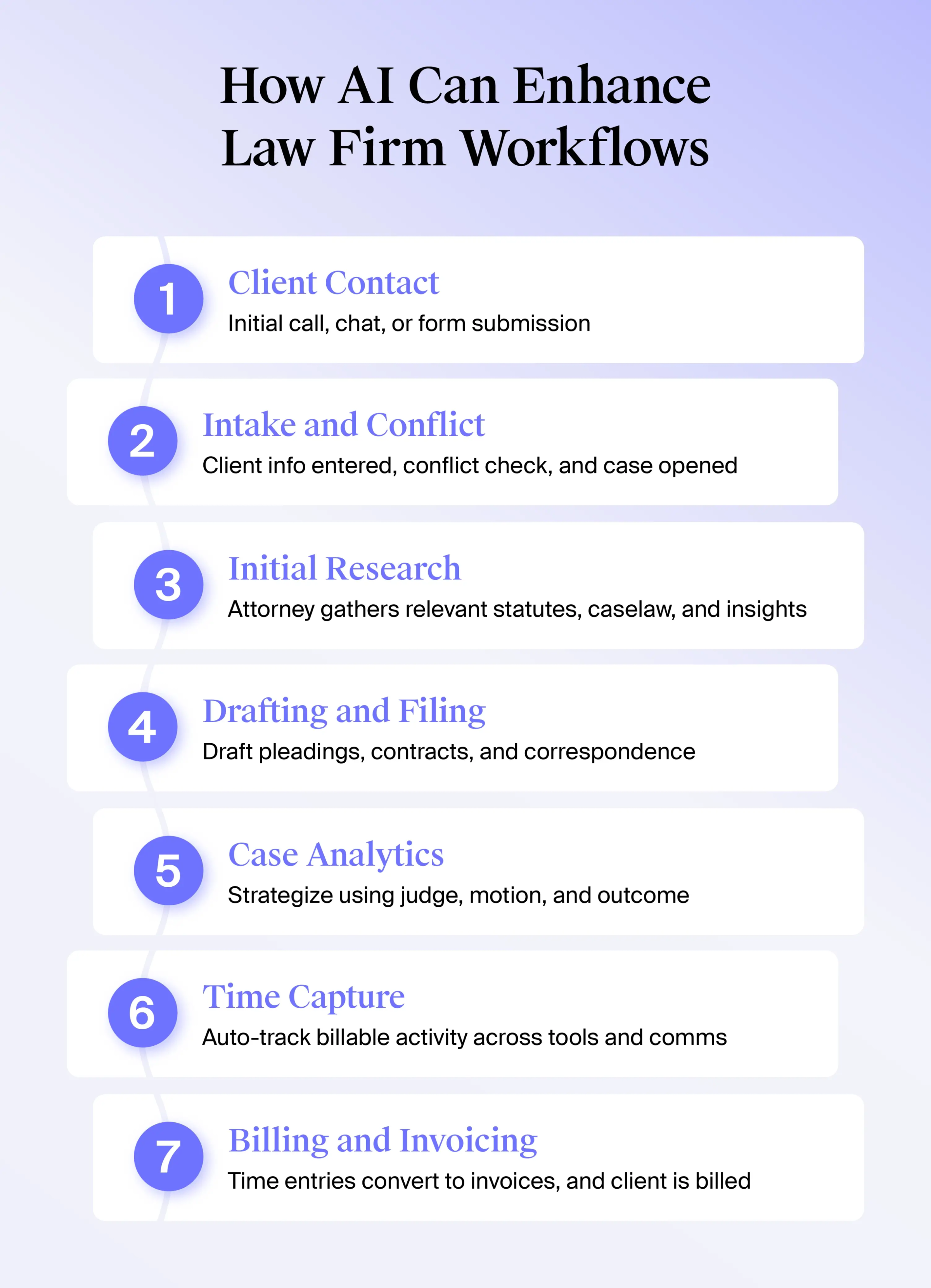
Leverage MyCase’s Legal AI Tools For Your Firm
Purpose-built AI platforms streamline every corner of practice, from drafting documents and surfacing precedents to predicting outcomes, capturing time, and greeting new clients while you sleep. MyCase bundles those capabilities inside a single, secure workspace, freeing up precious time for lawyers and support staff.
Book a personalized walk-through of MyCase IQ to see how document editing, summaries, and other upcoming features fit seamlessly into your current workflow.
Schedule a demo and start putting legal AI to work for your clients and your bottom line today.
If you’re ready to go deeper into choosing the right tools for drafting and writing, explore our guide to the 8 best AI tools for legal writing & drafting in 2025.
FAQ About Legal AI Tools
About the author
Sammi Jones is a Senior Content Strategist for 8am, a leading professional business solution. She covers the latest advancements in legal technology, financial wellness for law firms, and key industry trends.

